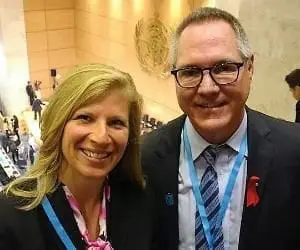Northwestern is represented well at global health summit
Rob Karwath for NWHSU | May 25, 2018
NWHSU President and CEO Chris Cassirer and Executive Director of Research and Innovation Michele Maiers are attending the 71st World Health Assembly in Geneva, Switzerland.
Northwestern Health Sciences University has been well represented this week at the World Health Assembly of the World Health Organization, the United Nations agency focused on international health.
Northwestern President and CEO Chris Cassirer and Executive Director of Research and Innovation Michele Maiers are attending the 71st World Health Assembly in Geneva, Switzerland. Cassirer and Maiers both hold formal positions with the World Federation of Chiropractic, which represents chiropractors in 88 countries and has an official affiliation with the World Health Organization.
Cassirer chairs the World Federation’s Public Health Committee and was the first non-chiropractor named to such a prominent leadership role when he took that post in 2016. Maiers recently was named to the Executive Council of the World Federation, which manages the daily affairs of the organization.
“It’s an honor to represent our university and to have Northwestern taking leadership roles with the World Federation and the World Health Organization,” Cassirer said.
He added: “We have a great story to tell about the work we do in chiropractic, which can have so much benefit for public health globally. We see those benefits playing out every day on our campus, with our students, with our alumni and through our partnerships. This global conference is another example of how Northwestern and chiropractic are helping to create a healthier world.”
Maiers said, “Our discussions here will motivate additional discussions and work at Northwestern and in the communities where we are involved. We also are adding our voices to conversations about better individual and public health and how what we do and teach at Northwestern can be examples for our colleagues around the world.”
Topics being discussed at the World Health Assembly include integrated care, universal health insurance coverage, youth and women’s health issues, health impacts of aging as well as the ability of digital communications to better inform and educate more of the world’s population about health.
One topic of discussion focused on a call by international experts for action to address the burden of musculoskeletal conditions such as arthritis and low back pain, which affect one in three people worldwide.
A paper published in the May edition of the Bulletin of the World Health Organization examined the global impact of more than 150 musculoskeletal conditions and called for action to address root causes of these problems, which affect people’s abilities to work and to participate in societies.
Also, the WHO has signaled a shift to a larger emphasis on non-communicable diseases such as chronic illness, back pain, obesity and diabetes.
And the Public Health Committee of the World Federation of Chiropractic, chaired by Cassirer, has developed a paper, expected to be published soon, that discusses overuse of opioid medications, approaches to ensure healthy aging and health needs of women, children and adolescents—all also points of emphasis in the teaching and clinical work at Northwestern.
For more information about these issues and the World Health Assembly, please go to www.who.int.

Dr. Cassirer and Michele Maiers at WHO conference